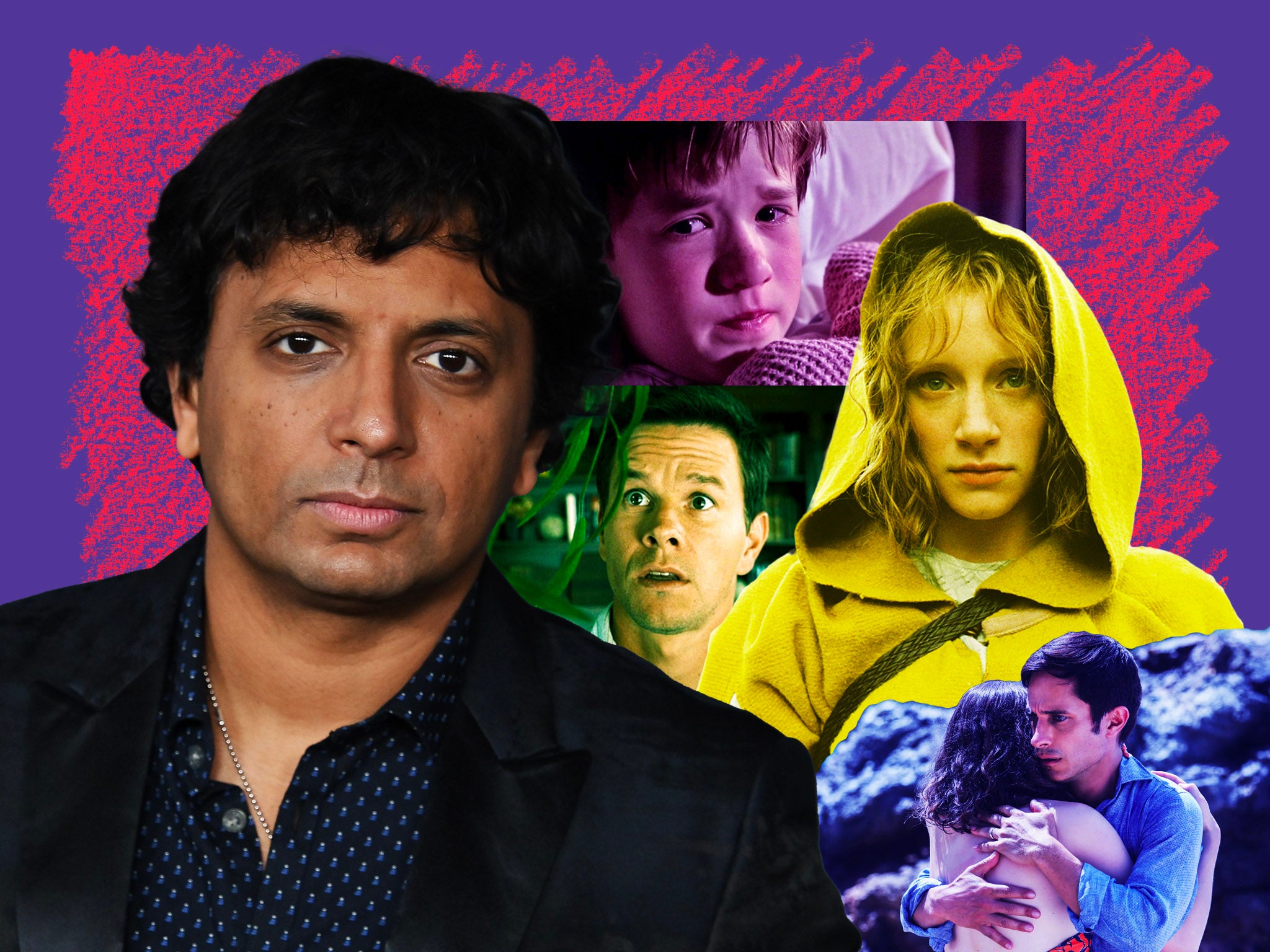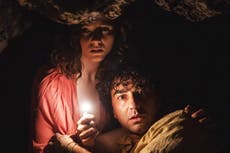An M Night Shyamalan comeback? Now that’s a twist no one saw coming
The ‘Sixth Sense’ mastermind never deserved the mockery that seemed to trail him at the midpoint of his career, writes Adam White. Thankfully, with his new film ‘Old’ and his recent run of hit B-movies, he’s finally embraced his schlocky uncoolness


In 2013, M Night Shyamalan’s name had become so toxic that it was completely absent from the posters of what was then his latest movie – the Will Smith/Jaden Smith dystopian father/son romp After Earth. Such a decision didn’t come about because Shyamalan’s films had been underperforming. Even the silliest of them, the killer plant fantasia known as The Happening, had made a boatload of money just five years earlier. This was more because of Shyamalan himself. His brand – spooky, Hitchcockian B-movies vacillating between dopey and profound – was seen as depleted, his dependence on twist endings too predictable. Worse still, the internet had decided he was deathly uncool.
Today, Shyamalan’s reputation has been turned around. Sort of. He probably won’t return to the creative heights of his earliest fame – the enviable one-two punch of The Sixth Sense in 1999 and Unbreakable a year later – but he’s no longer seen as a film-making liability, or someone whose involvement in a project needs to be carefully concealed. His name still conjures strong opinions, though. In tandem with the release of his new film, the beach-side chiller Old, Shyamalan has been at the centre of Twitter discourse: his movies suck; he’s actually great; why has he never been able to write dialogue? And so forth. The sky is blue, M Night Shyamalan is polarising. But how did it get like this?
When I think back to being terrified in the cinema as a child, a few movies come to mind. There is Disney’s The Hunchback of Notre Dame, a gothic nightmare far too frightening for my four-year-old self to withstand in 1996. Later, there was the worry that Katie Holmes – or the sweet, virtuous Joey Potter of Dawson’s Creek at the time – might be killed by a sniper in Phone Booth. I remember quite literally shaking in the front row at that one, for some reason. All my other memories of unbridled cinema-seat hysteria were crafted by Shyamalan: the grainy VHS recording of the alien disturbing the birthday party in Signs, a blind Bryce Dallas Howard being stalked through the woods by weird stick-monsters in robes in The Village, Mischa Barton vomiting up blue soup in The Sixth Sense. M Night Shyamalan had me and my precious heart rate under his boot for what felt like my entire childhood.
Then, somewhere around the release of his strange mermaid fiasco Lady in the Water in 2006, I was very loudly informed that M Night Shyamalan was lame. It was a bit like those murderous neurotoxins in The Happening – I didn’t know where it came from, nor what it meant or why everyone found it hilarious, but it hovered in the air. M Night Shyamalan was undeniably a 21st-century Ed Wood, the claim went, and we’d all been briefly sucked into the illusion that he was less an auteur than an incompetent schlockmeister.
It seemed to stem from the expectations placed upon him, and ones that Shyamalan, admittedly, ran with himself. The incredible success of The Sixth Sense – in which Haley Joel Osment saw dead people and Bruce Willis [REDACTED] – saw Shyamalan anointed an out-of-nowhere wunderkind. He’d floated around Hollywood for close to a decade already, memorably performing script doctor duties on the Freddie Prinze Jr romcom She’s All That of all things, but that didn’t really fit the narrative.
When he followed up The Sixth Sense with Unbreakable, his rain-soaked spin on the superhero origin story, he was officially anointed the most exciting young film-maker in America. Newsweek, in 2002, dubbed him “The Next Spielberg”. Two years later, he had become so famous that he sparked headlines by publicly condemning a documentary made about him that suggested he may be a clairvoyant, or “touched” by the supernatural. It quickly turned out not to be an “unauthorised documentary” after all, but rather a hoax that Shyamalan was actively involved with. Even the most forgiving of his fans would struggle to not find such a stunt annoying. The wheels seemed to fall off from there. To experience his films was like “watching a magician pull … a mangy rabbit out of a battered top hat”, as one critic wrote in 2008.
That so many of his early films hinged on surprise endings probably didn’t help during the backlash against him. Twists are dangerous that way. Write a great one, and the film becomes a classic. Write a dubious one, and the whole thing sours as a result. Technically, Shyamalan isn’t quite as reliant on plot twists as he’s believed to be – there are, what, three of his movies that feel particularly twisty? – but the narrative of Shyamalan as twist-maestro stuck. Likewise, the claim that he’s not very technically skilled. But that only works if you overlook the visual wonder of so many of his movies, particularly the early ones.

In general, though, his films have always tended to be… fine. The Village (2004) is ludicrous, with a twist ending that could be seen a mile off, and Lady in the Water a far-too-ambitious failure, but there’s a hokey genius to almost everything that Shyamalan touches. While the comparison ended up a bit of an albatross, Shyamalan has always had a bit of Spielbergian purity about him. He writes and directs with the spirit of an 11-year-old who has just discovered their older sibling’s VHS collection. He likes jump scares and neat, Twilight Zone-style twists – the kind you’d tell your friends about in the playground the next day. There’s a sliver of apple-pie wholesomeness to much of his work, too. They all seem to feature supportive family units, cute kids, nice houses. Cynicism bounces off him. It’s no wonder so much of the internet – with its tendency for snarky rejection of the earnest – finds him objectionable.
Eventually, the criticism did get to him. In 2019, he admitted during an appearance at New York University’s Stern School of Business that he took on the decidedly un-Shyamalan M Night Shyamalan projects The Last Airbender (2010) and After Earth partly because he didn’t want to be trashed any more. “There has always been this inexorable pull to join the group, a constant seduction… in the form of money, or safety, ease, not getting criticised,” he explained. “I did these movies, and I rightfully got crushed, because they rightfully said, ‘You don’t believe in yourself, you don’t believe in your own voice, and you don’t believe in your values.’ I felt really lost. It just didn’t work.”
Since those crushingly anonymous misfires, Shyamalan has embraced what made him so much fun in the first place. He’s in the midst of a run of goofy B-movies awash in charm and silliness – The Visit (2015) was a low-stakes riot about evil old people, the multiple-personality thriller Split was Brian De Palma meets a Saw movie, while its sequel Glass was a hearty throwback to an era in which superhero movies didn’t have to be so damn serious. It’s as if Shyamalan has settled comfortably into his own uncoolness, happy to make concept-heavy chillers with arresting poster art and succinct run times. Sometimes you want the horror genre to be elevated and worldly and ripe with metaphor. Other times, you just want to see a satanic grandma crawling up the walls of a lift. M Night Shyamalan: comeback kid? Now that’s a twist no one saw coming.
Join our commenting forum
Join thought-provoking conversations, follow other Independent readers and see their replies
Comments


Bookmark popover
Removed from bookmarks